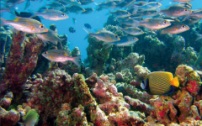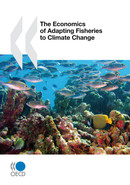Fisheries
Climate change and fisheries
|
|
Climate change will affect fish and their habitats. Warmer temperatures will influence the abundance, migratory patterns and mortality rates of wild fish stocks and determine what species can be farmed in certain regions. |
While most work on climate change in fisheries has focused on fisheries science, OECD highlights the economic and policy aspects of adapting the fisheries sector to climate change. Fisheries policy makers need to develop adaptation strategies that take into account the economic consequences of climate change - strategies that must themselves be adaptable to the uncertainty of climate change.
OECD analysis and policy advice aims to ensure that the fishing and aquaculture sectors are environmentally and economically sustainable.
Recommendations
- Strengthen global governance of fisheries
- Communicate clearly with stakeholders, including the public, on how climate change will affect fisheries
- Extend the use of rights-based management systems
- Protect ecosystems
- End environmentally harmful subsidies
- Focus on aquaculture and on demand for sustainably caught seafood
Further reading
|
|
The Economics of Adapting Fisheries to Climate Change (March 2011) |
- White pox, dynamite, cyanide, and coral (OECD Insights blog)
Overfishing — including destructive fishing — affects more than 55% of the world’s coral reefs. The million tons of fish taken from them each year is three times beyond the sustainability limit. The OECD Insights blog looks at the threat to our coral reefs. - Workshop on the Economics of Adapting Fisheries to Climate Change, June 2010
Read the presentations and session details from this workshop, where participants shared their experiences and recommendations on how fisheries can meet the challenges of climate change.
Related links
Related Documents

